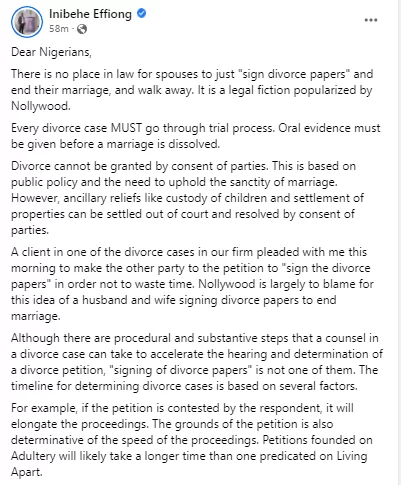
Legal practitioner, Inibehe Effiong has taken to social media to educate Nigerians on the process of marriage dissolution.
In his post, Effiong stressed that contrary to what ''Nollywood'' has portrayed over the years, there is no place in law where a couple can just sign divorce papers and end their marriage. He stressed that the dissolution of a marriage must undergo trial in a High court and that many factors including oral testimony of both parties must be admitted by the court before dissolution can be effected.
He pointed out that no judge in Nigeria will make an order dissolving a statutory marriage without listening to oral testimony. He added that there have been cases where both spouses wanted divorce but the court refused to dissolve the marriage because there was no sufficient evidence to support the petition.
His post reads
''
Dear Nigerians,
There is no place in law for spouses to just "sign divorce papers" and end their marriage, and walk away. It is a legal fiction popularized by Nollywood.
Every divorce case MUST go through trial process. Oral evidence must be given before a marriage is dissolved.
Divorce cannot be granted by consent of parties. This is based on public policy and the need to uphold the sanctity of marriage. However, ancillary reliefs like custody of children and settlement of properties can be settled out of court and resolved by consent of parties.
A client in one of the divorce cases in our firm pleaded with me this morning to make the other party to the petition to "sign the divorce papers" in order not to waste time. Nollywood is largely to blame for this idea of a husband and wife signing divorce papers to end marriage.
Although there are procedural and substantive steps that a counsel in a divorce case can take to accelerate the hearing and determination of a divorce petition, "signing of divorce papers" is not one of them. The timeline for determining divorce cases is based on several factors.
For example, if the petition is contested by the respondent, it will elongate the proceedings. The grounds of the petition is also determinative of the speed of the proceedings. Petitions founded on Adultery will likely take a longer time than one predicated on Living Apart.
I should stress that in every petition, the law requires the petitioner to specifically state that the petitioner and the respondent have not colluded or connived to bring the petition. An affidavit must accompany the petition to verify that the content of the petition is true.
Simply put, even where the parties (husband and wife) are no longer interested in the marriage and desire to go their separate ways, a petition MUST be filed in the High Court, and oral evidence must be adduced to prove the ground(s) of the petition before dissolution.
No judge in Nigeria will make an Order Nisi dissolving a statutory marriage without listening to oral testimony. There have been cases where both spouses wanted divorce but the court refused to dissolve the marriage because there was no sufficient evidence to support the petition.
I have said enough, I hope this clarification is useful and will guide people properly.''

















Comments